What could be more revealing about a country than chatting with a taxi driver? This is the strange proposal of Taxi!, the new comic strip by Aimée de Jongh after Days of Sand.
A world tour by taxi
Both scriptwriter and artist, Aimée de Jongh uses her travel experiences in four cities – Los Angeles, Paris, Jakarta and Washington – to confront us with humanity. Rather than a travel diary, she proposes to transcribe memorable conversations with taxi drivers. In addition, the author does not opt for a chronological narrative but mixes dates and places. Inevitably, this organization pushes the reader to comparison because, as ephemeral as they are, these conversations are extremely revealing. Through drawing and lyrics, it is the differences that emerge first, especially the national cultural codes. In France, we go hunting for taxis while in Jakarta drivers throw themselves on customers. The differences also affect the drivers, even though they are all men. Some are very talkative or even curious and others reserve their words for their personal conversations. We find the very Parisian competition between bikes and taxis but it is especially the stigmata of the attacks that mark when the author passes in front of the Bataclan. But over the pages of Taxi!, the same humanity emerges. This involves details such as football including the Dutch national hero Johan Cruijff but also deeper exchanges. The reader discovers different perceptions of death. Beyond religious differences, tolerance seems more or less present. Everywhere, the lives of these drivers are now more difficult like the arrival of Uber in Los Angeles. Taxi breaks stereotypes by showing by example that migrants move and are fully integrated. Sometimes the meeting fails because in Los Angeles where the driver does not pick up a smile or a word. Other times, the taxi reveals its personal history, from professional doubts, from the most intimate fears to this stranger. The person in the front seat is no longer a driver but a human being.
A Dutch woman in the back seat
 However, taxi! talks as much about the world as about the author. It starts with the principle of the book. Indeed, de Jongh does not drive because, like many Dutch men and women, she mainly uses the bicycle in her daily travels. Even in Los Angeles where she lived several times, Aimée de Jongh did not have a permit. She seems very talkative and outgoing so the silence makes her paranoid. Her family comes from Indonesia, she does not hesitate to criticize the racism of American customs officers. It is also she who selects the drivers, the themes of this book and therefore indirectly reveals the subjects that affect her. The author is a jack of all trades. She produced a daily series Snippers (Coloc' in French) published in Dutch and Swiss newspapers, she was known in Belgium for her children's albums and published more adult stories in France such as Jours de sable. In Taxi!, his line takes up the idea of the sketch taken on the spot to transcribe these conversations. The choice of black and white avoids the eye to get lost in a chromatic mosaic to focus on feelings. Published by La boîte à bulles, Taxi! takes you to the four corners of the world but especially inside the human soul. The reader begins with anecdotal remarks about the city but quickly becomes passionate about the exchanges between the author and these strangers who, at the end of the journey, discover themselves much more than expected. If you like this human crossing, you can find chronicles on My neighbor is Indonesian and Antananarivo.
However, taxi! talks as much about the world as about the author. It starts with the principle of the book. Indeed, de Jongh does not drive because, like many Dutch men and women, she mainly uses the bicycle in her daily travels. Even in Los Angeles where she lived several times, Aimée de Jongh did not have a permit. She seems very talkative and outgoing so the silence makes her paranoid. Her family comes from Indonesia, she does not hesitate to criticize the racism of American customs officers. It is also she who selects the drivers, the themes of this book and therefore indirectly reveals the subjects that affect her. The author is a jack of all trades. She produced a daily series Snippers (Coloc' in French) published in Dutch and Swiss newspapers, she was known in Belgium for her children's albums and published more adult stories in France such as Jours de sable. In Taxi!, his line takes up the idea of the sketch taken on the spot to transcribe these conversations. The choice of black and white avoids the eye to get lost in a chromatic mosaic to focus on feelings. Published by La boîte à bulles, Taxi! takes you to the four corners of the world but especially inside the human soul. The reader begins with anecdotal remarks about the city but quickly becomes passionate about the exchanges between the author and these strangers who, at the end of the journey, discover themselves much more than expected. If you like this human crossing, you can find chronicles on My neighbor is Indonesian and Antananarivo.






































